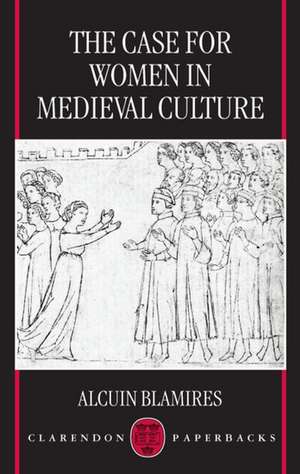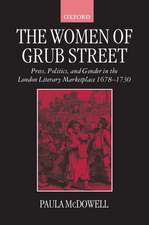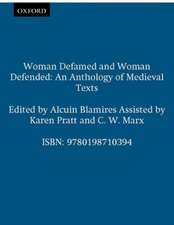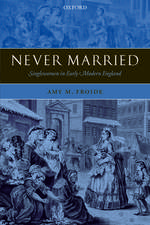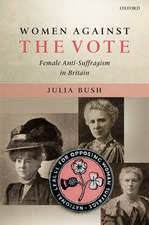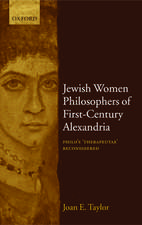The Case for Women in Medieval Culture
Autor Alcuin Blamiresen Limba Engleză Paperback – 27 aug 1998
Preț: 393.13 lei
Preț vechi: 543.54 lei
-28% Nou
Puncte Express: 590
Preț estimativ în valută:
75.24€ • 78.25$ • 62.96£
75.24€ • 78.25$ • 62.96£
Carte tipărită la comandă
Livrare economică 04-10 martie
Preluare comenzi: 021 569.72.76
Specificații
ISBN-13: 9780198186304
ISBN-10: 0198186304
Pagini: 288
Dimensiuni: 138 x 216 x 18 mm
Greutate: 0.4 kg
Ediția:Revised
Editura: OUP OXFORD
Colecția OUP Oxford
Locul publicării:Oxford, United Kingdom
ISBN-10: 0198186304
Pagini: 288
Dimensiuni: 138 x 216 x 18 mm
Greutate: 0.4 kg
Ediția:Revised
Editura: OUP OXFORD
Colecția OUP Oxford
Locul publicării:Oxford, United Kingdom
Recenzii
sober, learned, and elegant monograph ... Blamires's book is a deeply informative and scholarly study of the defences of women produced in the high and late Middle Ages. Sound scholarship is everywhere on display, especially in tracing the textual and scriptural origins of the formal defence and its misogynous context, and in particular in identifying the importance of the third Book of Esdras as a source. He provides a useful history of formal defences of women from the end of the eleventh century, with summaries of their innovations. Blamires is especially interesting on the question of maternity.
Blamires convincingly illustrates that however mired in the self-reflective constructs of male authority, there was an increasingly vigourous case made on behalf of women in the literature of the Middle Ages. Blamires' achievement lies not only in laying bare roots of this tradition, but in judiciously presenting medieval texts both on their own terms and in the unflinching light of contemporary feminist theory. Blamires has here summarized and evaluated texts from the eleventh to fourteenth centuries in concise and fluid modern English: a wise decision, making an admirable lucidity of argument and hopefully a wide disemination of the work.
This study is a welcome response and complement to the recent emphasis on medieval misogyny ... an appropriately complex impression of medieval views of women ... Well read in modern feminist scholarship and in medieval and early modern literature, and generous in acknowledging the work of others, Blamires offers rich bibliographic references in the notes and the bibliography. This work is a treasury of valuable material.
a welcome presentation and analysis of the medieval textual tradition purporting to defend the good name of women ... This book is a pleasure to read, and it will certainly become a standard reference. Both erudite and accessible, its often complex material is presented with rigour and insight; the discussion puts the texts in their social and cultural contexts, and considers them on their own terms as well as from a late-twentieth-century perspective. The twenty-two page bibliography is a mine of information. There is no doubt that The Case for Women will find its place on many reading lists, and not just for students of medieval literature.
This intelligent and interesting book. Alcuin Blamires here turns to a generic and thematic analysis of a relatively neglected corpus of texts that constitute what he defines as 'the case for women'... the book surveys a sufficiently wide range of material to suggest its value for those studying medieval and early modern culture. Blamires has made a significant contribution to our sense of how medieval writers manipulated and renewed their intellectual heritage.
Alcuin Blamires,The Case for Women in Medieval Culture is a pioneering study of the philosophical and theological tradition of pro-feminine arguments which established writers such as C. were able to draw upon in their defence of women against misogynist opinion.
Blamires convincingly illustrates that however mired in the self-reflective constructs of male authority, there was an increasingly vigourous case made on behalf of women in the literature of the Middle Ages. Blamires' achievement lies not only in laying bare roots of this tradition, but in judiciously presenting medieval texts both on their own terms and in the unflinching light of contemporary feminist theory. Blamires has here summarized and evaluated texts from the eleventh to fourteenth centuries in concise and fluid modern English: a wise decision, making an admirable lucidity of argument and hopefully a wide disemination of the work.
This study is a welcome response and complement to the recent emphasis on medieval misogyny ... an appropriately complex impression of medieval views of women ... Well read in modern feminist scholarship and in medieval and early modern literature, and generous in acknowledging the work of others, Blamires offers rich bibliographic references in the notes and the bibliography. This work is a treasury of valuable material.
a welcome presentation and analysis of the medieval textual tradition purporting to defend the good name of women ... This book is a pleasure to read, and it will certainly become a standard reference. Both erudite and accessible, its often complex material is presented with rigour and insight; the discussion puts the texts in their social and cultural contexts, and considers them on their own terms as well as from a late-twentieth-century perspective. The twenty-two page bibliography is a mine of information. There is no doubt that The Case for Women will find its place on many reading lists, and not just for students of medieval literature.
This intelligent and interesting book. Alcuin Blamires here turns to a generic and thematic analysis of a relatively neglected corpus of texts that constitute what he defines as 'the case for women'... the book surveys a sufficiently wide range of material to suggest its value for those studying medieval and early modern culture. Blamires has made a significant contribution to our sense of how medieval writers manipulated and renewed their intellectual heritage.
Alcuin Blamires,The Case for Women in Medieval Culture is a pioneering study of the philosophical and theological tradition of pro-feminine arguments which established writers such as C. were able to draw upon in their defence of women against misogynist opinion.
